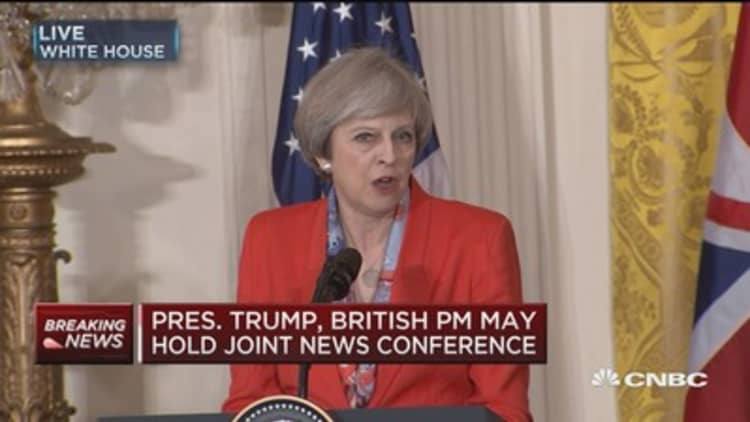Amid the talk of trade wars, American beef producers see a golden opportunity overseas with Britain leaving the European Union.
The EU ban on hormone-treated beef from the U.S. essentially closed a major market for American producers more than a decade ago and made it harder to sell to the U.K., but Brexit and talks over a U.S.-U.K. trade deal could set the stage for American beef to once again enter Britain.
"A U.K. agreement will be a good opportunity for us to actually base trade on science rather than just a precautionary principle and undue fear," said Colin Woodall, vice president of government affairs for National Cattlemen's Beef Association, a U.S. trade group representing more than 200,000 cattle ranchers and feeders. "U.K. has been under the blanket EU restrictions where they will only take non-hormone, non-antibiotic treated beef."
President Donald Trump held a meeting Friday at the White House with U.K. Prime Minister Theresa May. Speaking at a joint press conference after the meeting, May said she's discussing with Trump how "we can establish a trade negotiation agreement, take forward, immediate high-level talks, lay the groundwork for a U.S.-U.K. trade agreement."
Treating cattle with certain growth-promoting hormones is a common practice in the U.S. beef industry. The EU ban on hormone-treated beef dates back to the 1980s, and eventually led the U.S. taking the issue to the World Trade Organization. The WTO found in favor of the U.S. producers in 1998 and then worked out a memorandum of understanding in 2009 with the EU trying to regain some of that access.

Yet, Woodall said the current arrangement continues to be a trade barrier for American beef producers. "We still don't have the full access that we would really like," he said.
Even if there's a U.S. trade deal with Britain after Brexit, there's no guarantee London would relax rules allowing imports of hormone-treated beef. Most of the beef consumed by British consumers today is produced within the EU.
In December, the Obama administration took action to reinstate trade actions against the 28-member EU over "unfair trade practices that discriminate against U.S. beef imports."
The Office of the U.S. Trade Representative is scheduled told hold a Feb. 15 hearing over the EU beef spat and then determine whether imposing additional punitive duties on particular EU food products imported into the U.S. "would be practical or effective in terms of encouraging a favorable resolution of the dispute."
U.S. beef industry exports are roughly $6 billion annually, representing about 15 percent of the total domestic beef production. At present, Japan, Mexico, South Korea, Canada and Taiwan are the largest U.S. beef export markets. Last year, China agreed to reopen up its market to U.S. beef but thus far it hasn't started any significant imports.


